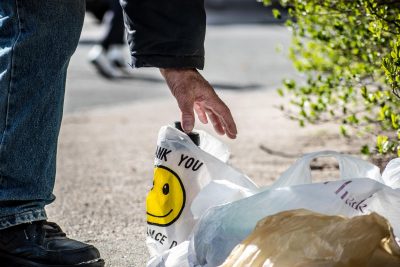Plastic bag restrictions will return to Boston Thursday after Mayor Marty Walsh temporarily lifted the restrictions because of the pandemic.

The temporary exemptions granted by an executive order issued in March allowed retail businesses to use plastic bags, according to an Inspectional Services Department press release.
Lisa Timberlake, director of publicity for the Inspectional Services Department, wrote in an email that the order gave businesses more flexibility during the public health crisis.
With the end of Walsh’s temporary order, businesses must return to pre-COVID-19 practices of charging a small fee for compostable bags and allowing reusable bags in the store, according to the press release.
Aron Stubbins, an environmental science professor at Northeastern University, said this reduction in single-use plastics is important because they remain in the environment for extended periods of time without decomposing.
“Reinstating the plastic bag ban is good for the environment,” Stubbins said. “It’s also a very visible way of keeping the issue of plastic waste generation in people’s minds.”
The temporary lift on restrictions didn’t cause significant harm to the environment because of its short duration, Stubbins said.
“With the balance between public health and having a short-term lift on that ban, it was probably the right decision,” Stubbins said. “Awareness is key because if the public aren’t informed, then they can’t create the conditions for political action, and without that, it’s rare that the politicians will act to change the law in a way that impacts business.”
Margaret Sobkowicz-Kline, an associate professor in the Plastics Engineering department at the University of Massachusetts Lowell, said while reinstituting plastic bag restrictions can reduce waste, this alone isn’t enough. For instance, she said heavier paper bags produce more emissions.
“If you ban plastic bags, and the people use paper rather than a reusable bag,” Sobkowicz-Kline said, “that can actually have a negative impact on the environment through the increased use of fossil fuels to transport goods.”
The ban will reduce plastic waste, Sobkowicz-Kline said, since single-use plastic waste cannot decompose or be reused. She added that reusable bags are the most sustainable.
“If you can use the reusable bag many times,” Sobkowicz-Kline, “that’s the lowest-carbon-footprint option.”






















































































































